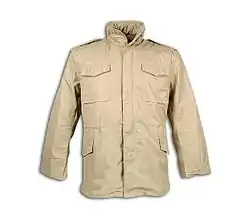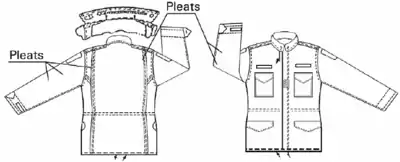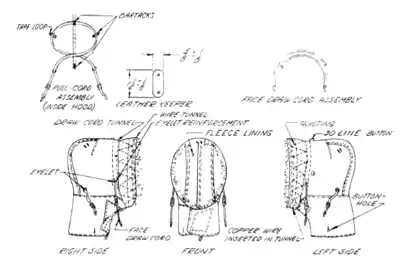M-1965 field jacket
The M-1965 field jacket (also abbreviated as M-65) is a straight front, cold weather, field coat made of water-repellent fabrics.[1] Initially designed for the United States military under the MIL-C-43455 standard,[2][3] it is now often worn by civilians as an ordinary item of clothing.
 M65 jacket in beige | |
| Type | Outerwear |
|---|---|
| Material | Various water-repellent fabrics |
| Place of origin | United States |
| Manufacturer | U.S. Armed Forces (originally) |
| Introduced | 1965 |
History
The jacket was introduced into U.S. military service in 1965 to replace the M-1951 field jacket which was an improvement on the M-1943 field jacket of World War II design.[4] It has a built-in hood that can be rolled up and fits into a pouch on the back of the neck as opposed to the separate hood that attached to the M-1951. The M-65 also has velcro fasteners on the sleeve cuffs and collar.
The M-65 field jacket was widely used by United States forces during the Vietnam War in which the jacket became useful for troops serving in the central highlands of South Vietnam, especially in cool weather conditions following monsoonal rains.[5] It was a standard issue to U.S. troops participating in several other wars all around the world as well.
Originally introduced in OG-107, it is now produced in a large variety of colors and patterns, including military camouflage.[4] The frontmost portion of the jacket has two large hip pockets and two medium-sized breast pockets, both sets of pockets are triple stitched. The rearmost neck portion and collar of the jacket features a zipper which houses a protective hood.[4] Genuine M65 field coats made to "milspec" for the U.S. government will have a contract number that is set up like (DSA XXX-XX-X-XXXX).
The M-1965 field jacket can be combined with a button-in insulated lining for cold-weather wear, original ones were produced by the government contractor Gibraltar Co., as well as the button-on, fur-trimmed M51 winter parka hood. Note that only genuine Milspec M65 field coats can button on the winter hoods made for them. It was made by Alpha Industries, and John Ownbey Co., Inc. as well as other companies like Propper, Golden Manufacturing, Sportsmaster Inc. and many more, for the military.[6][7]
The olive drab M-1965 Field Coat (commonly called the M-65 Field Jacket) was issued until late 1980s. In 1981, the U.S. military introduced its "M81" woodland camouflage pattern and the M-1965 began to be printed in that pattern to complement the U.S. Army's Battle Dress Uniform (BDU). An additional version of the jacket, printed in the same camouflage design as the Desert Camouflage Uniform was issued in the 1990s.[8] With the introduction of the Army Combat Uniform (ACU) in 2005, a final variant of the field jacket was issued in the then-new Universal Camouflage Pattern, with patches of hook-and-loop fasteners on the sleeves near the shoulder area to match the Army's new ACU uniform design. The U.S. Army ceased issuing the jacket in 2009.[9]
Design

The jacket is a lined hip length design, having a bi-swing back;[Note 1] a fly front closure secured by a zip and snap fasteners. It has two piece set-in sleeves (with adjustable cuffs and hand shield extension) and a convertible stand-up collar. The collar has an adjustable tab closure, secured with loop fastener tape and a horizontal zip fastener closure on the under-collar, which acts as the exit for the built-in hood. The built-in hood has a single draw-cord adjustment, and, when not in use, is concealed between the jacket outer shell and fabric liner. [10]
The jacket has two bellows type breast pockets and two lower inside hanging pockets all with flap closures secured by snap fasteners. The specification (revision K) requires pieces of loop fastener tape in the following positions for insignia: at top of each sleeve for placement of patches; on the right and left sides of the chest directly above the breast pockets for name-tape and U.S. Army tape and a piece of loop fastener tape for the rank centred between the second and third snap fastener on front flap. There are also pieces of fastener tape on the collar tab, under-collar, sleeve tabs and outside of underarm.[10]
The jacket collar incorporates four buttonholes for attachment of a separate fur-ruffed hood (MIL-H-43555: HOOD, EXTREME COLD WEATHER, W/SYNTHETIC FUR RUFF).

On the inside of the jacket there are buttons for attaching the insulating liner in cold weather. The liner is specified by MIL-L-43536. It has open underarms, buttonholes at the neck and front edges, and buttonhole tabs at the sleeve bottoms for attaching the liner to the jacket. The liner is quilted and made of polyester batting covered with 3 plies of ripstop nylon cloth. It was redesigned (i.e. buttons were added to its front) to make it capable of being worn independently of the field jacket.
In popular culture
The jacket appears in several films including The Street Fighter; Return of the Street Fighter; The Street Fighter's Last Revenge; Taxi Driver; SLC Punk; Serpico; Annie Hall; First Blood; The Exterminator, The Exterminator 2; The Terminator; RoboCop; Jacob's Ladder; Jaws 2, The Goodbye Girl, My Bodyguard, Bloodsport, Running Scared, True Romance, Ghost Dog: The Way of the Samurai, 8 Mile, Frozen City, and My Friend Dahmer. It featured prominently on the television series, Gilmore Girls and Freaks and Geeks. Most recently it was worn by Liam Neeson in the film Run All Night; by the character James Sunderland from the video game Silent Hill 2; by the character Lincoln Clay from the video game Mafia III; and sometimes by the character Dean Winchester from the television series Supernatural.
Notes
- A bi-swing back incorporates deep pleats starting at the back waistline or belt and extending up to the shoulder on each side, to avoid constriction when the wearer's arms are extended.
References
- "Technology transfer highlights through the years at the Natick Soldier Center". Archived from the original on 2009-09-19. Retrieved 2015-08-14.
- https://quicksearch.dla.mil/qsDocDetails.aspx?ident_number=23626
- "MIL-C-43455: COAT, COLD WEATHER, FIELD". CIE Hub.
- "M-1965 FIELD JACKET". Olive-drab.com. Retrieved 2013-11-23.
- Rottman, Gordon L. (2005-07-13). US Army Infantryman in Vietnam 1965-73 - Gordon Rottman - Google Boeken. ISBN 9781841768878. Retrieved 2012-08-15.
- "The M-65 Field Coat".
- "Alpha Industries History". Archived from the original on September 20, 2014.
- "M-1965 Field Jacket". olive-drab.com.
- "Field Jacket - a Eulogy - Soldier Systems Daily".
- MIL-DTL-43455K: COAT, COLD WEATHER, FIELD. Defense Supply Center, Philadelphia. 2007-08-02.